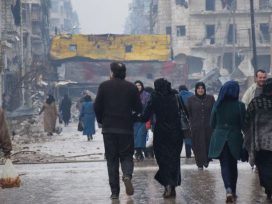Abstracts for Esprit 2/2007
Henri Prévot
The climate disaster and French energy policy
If we are to tackle the greenhouse effect, we must curb carbon dioxide emissions and at the same time consider what we foresee as the forthcoming shortage of energy resources. However, if we think that the real priority is to stabilize climate patterns, then it appears that we have a surfeit of fossil energy and we must shift our energy strategy without waiting for international coordination.
Jérôme Sgard
The greenhouse effect and development in the South. The case of Amazonia
Brazil has launched into robust economic development policies. And yet, for the sake of the global environmental balance, it must refrain from overexploiting the resources in Amazonia. How do we reconcile these imperatives while keeping Southern countries immune from the constraints that derive from the type of development on which the North has been thriving? How do we simultaneously take in the life of Amazonian communities, Brazil’s national interests, and the global challenge of climate change?
An interview with Jean-Pierre Dupuy
From Ivan Illich to nanotechnologies. Disaster prevention?
As he looks back on his own intellectual evolution and his books, the philosopher tells how climate change has brought him back to the thinking of the late Ivan Illich, whom he was close to early on in his own career. What with the emerging climate challenges and his own offbeat intellectual pursuit, Jean-Pierre Dupuy thinks of technology as an “enlightened catastrophism” which may be as inevitable as it is paradoxical.
Michel Giraud
The misfortunes of moving to mainland France
The relationship between those Antilles-born French people who went to Europe to live in “mainland” France and those who stayed in the Lesser Antilles has changed over the course of a single generation. They first went as migrants, but now they are insisting that their children are brought into the fabric of French society, as they realize that the French citizenship they inherited from their elders does not preserve them from various types of discrimination.
A panel discussion with Daniel Maximin, Stéphane Pocrain, and Christiane Taubira
How to remember slavery
Why should the remembrance of slavery as a recognized crime against humanity be written in France’s statute book? As they revisit the origins of a bill to that effect, the discussants shed light on the whys and wherefores of the demands being made on law-makers.
Laurent Dubois
The histories of slavery in France and the United States
In contrast to what happened in America, France has proved unable so far to mainstream colonial history and slavery into the shared national narrative. And yet the history of France’s overseas empire and of the local communities’ appropriation of the ideals of the French Revolution is not at odds with the history of the French Republic, and this calls for a subtler approach from history scholars.
Élisabeth Landi and Silyane Larcher
Colonial remembrance as viewed from Fort-de-France (Martinique)
In a dialogue that starts off with recent demands over the remembrance of colonialism on the French island of Martinique, the two history scholars wonder how we should understand this use of history. Is this yet another claim to regional identity, or a falling-out with the liberation struggle of the past, or alternatively an aspiration to weave the former colonies into the national narrative?
Dany Joseph Ducosson
Guadeloupe’s sham and showy nationalism
On the French island of Guadeloupe, a novel type of identity-related narrative is taking shape that is less pro-independence but at times overtly xenophobic, and particularly so vis-à-vis refugees from nearby French-speaking Haiti. This goes to show how difficult it is for Guadeloupe to evolve an identity that would look beyond local frictions and effectively make for a smoother relationship with “mainland” France.
Fred Constant
For a social construction of the claims to remembrance of self-styled “victims”
Historical claims will often be construed in relation to some cultural pattern, with communities nowadays “competing” for recognition. However, if those claims to remembrance evince anything, it must be less some latent separatism than the groundwork for an attempt to join the mainstream and achieve recognition of collective dignity.
An interview with Lilian Thuram
A history to bequeath
A fielder for the French national football team who also played for Italian and Spanish teams, Caribbean-born Lilian Thuram has for some time been interested in the history of slavery as well as in today’s discriminatory practices, and now sits on France’s Council on Social Integration. He is well aware of the civic role that he can play, and supports any efforts in the educational system that would enhance awareness of history’s occasionally dubious legacy.
Patrick Weil
The politics of remembrance: Taboo and commemoration
Was it a good thing for lawmakers to tinker with history? Was it a good thing to declare slavery a crime against humanity? These two questions have caused quite a stir among history scholars, evincing antagonistic declarations from various communities. A historical enquiry into the statutory and commemorative aspects of the abolition of slavery shows how the continuities of history and republican thinking are not broken by a determination to formally recognize France’s responsibility in the slave trade.
François Danet
A&E medicine as drama play
Adding to our special January 2007 issue on French hospitals, this article takes another perspective on the rationale behind the demands voiced by some practitioners in Accident & Emergency wards, who have managed to garner interest from the media and the political class. How did the A&E doctor come to emerge as a hero in the eyes of the general public, what does this tell us about current perceptions of medicine and of the hospitals where these wards are gaining ever higher profiles?
Olivier Mongin
Political issues, major and minor. All quiet before the storm!
As viewed through a string of recent political essays and the comments which its inception is eliciting, the French presidential election campaign makes an odd sort of impression: it is as though the essential issues are kept under wraps, with France anxious and uncertain about herself. But then instead of opening out to the surrounding world that drives us along, we keep pondering over our own little home-grown ideologies and their untold truths, denials, and cynicism.
Published 15 February 2007
Original in French
Contributed by Esprit © Esprit
PDF/PRINTNewsletter
Subscribe to know what’s worth thinking about.



